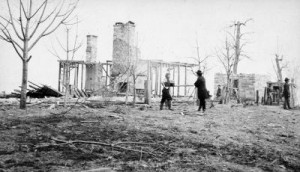
Robert Craven’s house atop Lookout Mountain was destroyed during the Battle of Lookout Mountain. The Craven’s house was rebuilt following the war. Courtesy of the Chattanooga Public Library.
The second day of the Chattanooga Campaign proves similar to the first in that the Union again emerges victorious. Today’s Union victory in the Battle of Lookout Mountain is impressive and decisive.
In the “battle above the clouds,” U.S. troops, led by General Joseph Hooker, climb the slopes of Lookout Mountain in an effort to dislodge well-entrenched rebel forces. Anticipating difficulty in approaching the Confederate stronghold, Hooker’s forces instead find the going easy due to a heavy cover of fog that shrouds their movements from the rebels. Reaching the summit undetected, the 12,000 strong Union force tops the mountain and surprises the 1,200 Confederate defenders. The defender’s artillery proves useless in close-quartered combat, and by late afternoon the shocked and overwhelmed rebels abandon the mountain to Hooker’s forces.
The Union is now in control of the high ground from which the Confederates for weeks have been besieging Union-controlled Chattanooga. Conversely, General Braxton Bragg, commander of the Confederate Army of Tennessee and now reeling from two days of losses, scrambles to prepare for the third day of conflict. Another loss would be devastating to the army’s defense of the South and soldiers’ morale.
Many Baptists fight in the battle this day. Some survive, but many do not. Among the survivors is Norman F. Potter (1826-1900), a First Sergeant in Company E, 149th New York Volunteer Infantry. For his bravery this day, following the war on June 24, 1865 Potter receives the Congressional Medal of Honor, one of six 149th New York Infantry soldiers to be so honored. Potter’s citation reads, “Capture of flag (Bragg’s army)”.
Upon his death, Norman is buried in the Delphi Falls Baptist Church Cemetery, Delphi Falls, Onondaga County, New York.
Source: Battle of Lookout Mountain (link) and (link) and (link); “The Battles of Chickamuaga and Chattanooga,” Chattanooga Times Free Press, including photo (link); “Norman F. Potter,” Find a Grave (link)


